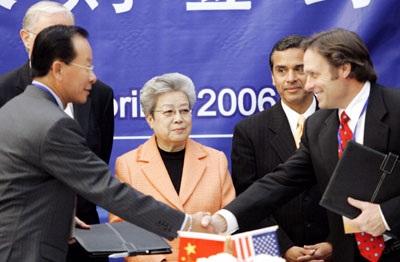Top News
China goes on a shopping spree in the United States
(chinadaily.com.cn)
Updated: 2006-04-07 09:03
 |
Large Medium Small |
China last year piled up a $200 billion dollar trade surplus with the United States, according to official US trade figures. The deficit has triggered Congressional proposals to impose tariffs on Chinese imports unless Beijing moves faster to raise the value of its currency, the yuan.
China has ruled out any sudden one-off shifts in its currency policy, insisting that it will move steadily, but gradually, toward a market-driven exchange rate. Lately, the yuan has quickened its pace of appreciation, and is climbing to the benchmark 1:8 dollar vs yuan rate.
 China's Vice-Premier Wu Yi (C) and Los Angeles Mayor Antonio Villaraigosa (2nd R) attend the signing ceremony of purchasing contracts and agreements between China and U.S. companies during Wu's visit to Los Angeles April 6, 2006. Wu is in the U.S. to attend the Sino-U.S. joint economic committee meeting in Washington, where she will bring together 16 Chinese ministers and a large number of Chinese entrepreneurs for the signing of over 4 billion dollars of purchasing contracts from the U.S. [Reuters] |
Officials here have signaled a willingness to do more to protect intellectual property rights, a perennial sore point with American companies. They have publicized fines imposed on Chinese companies that use pirated software. They may also commit to purchases of American software for government computers, the paper said.
The biggest action is on the trade front, with China expected to order at least 80 new Boeing aircraft, mostly single-aisle 737 models, official media reported. It could also commit to unprecedented purchases of agricultural commodities and cutting-edge telecom equipment needed to upgrade its fixed-line and mobile phone networks.
The foreign ministry official said the trade delegation, which also includes representatives of a dozen government ministries, is hoping to establish long-term ties with companies in the American heartland to promote sustaining imports in the future.
"We would like to emphasize that this is not a one-off," the official said.
The effort to ease trade tensions comes despite the fact that Chinese officials and some independent analysts argue that the current economic relationship, even with the large bilateral deficit, strongly favors the United States, the New York Times said.
Chinese officials point out that China is now American's fourth largest export market, with United States exports to China expanding at a 21.5 percent annual pace since 2001.
Officials have also cited academic studies showing that if inexpensive goods from China were not available, American business and consumers would have had to pay up to $100 billion more for the same products made elsewhere. They also say that much of the profit from manufacturing in China goes to American and other foreign companies and patent holders who assemble goods and license technology in China.
"The general feeling here is that the trade deficit does not really come at the US expense," said, an international relations expert at Beijing University. "The US makes money at every stage of Chinese production."